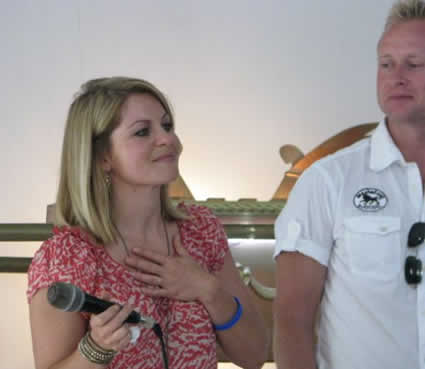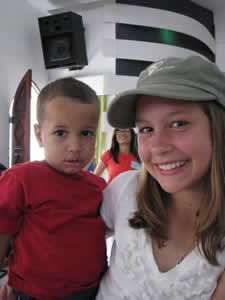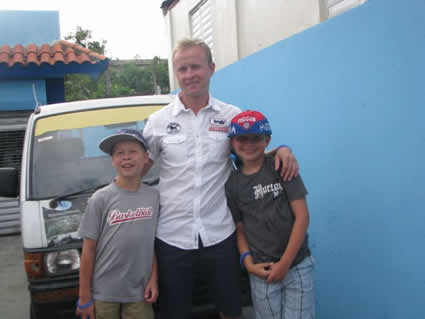Remember when Val Bure and Katia Gordeeva won the Battle of the Blades? Val donated his award money to Compassion — and mothers and babies in Moca, Dominican Republic, are now receiving health care, nutritional support and a whole lot of love thanks to his mad ice skills.
Last month, Val and his wife, Candace Cameron-Bure, had a chance to visit the program in the Dominican Republic with their three kids — Natasha, 12, Lev, 11, and Maks, 9.

On our Compassion tours, parents often bring their teenagers but rarely their younger children. Which raises the question: When should we start teaching our children about poverty and exposing them to the needs in the world around them?
For Val and Candace, it wasn’t even a question.
Val grew up in Moscow. Because his father was an athlete, his family had more provisions than many of his neighbors, but Val still knew what it was to go hungry. At times, his mom worked three jobs just to try to feed her kids. More than once, Val, his brother and his mother shared a single apple for a meal. So when Val and Candace visited the Dominican Republic, he felt like he was home; he could relate to so many of the children’s experiences with poverty.
For Val, shielding his kids from poverty simply didn’t make sense — to him this was life, this was reality. And Candace, who had observed poverty firsthand on a previous mission trip, wanted God to use the tour experience to plant a seed in her children’s hearts.
“Because we’re very fortunate with our jobs, our kids haven’t really had much experience with poverty. They haven’t seen how a lot of people live. We wanted them to see what it’s like and take something away, to come back appreciating what they have.”
Some people are hesitant to expose their young children to extreme poverty — unsure if it will be too much for them. Candace says she and Val were very sensitive to their kids, listening to and encouraging them when some things seemed overwhelming.

Now that they’ve been back for a couple of weeks, they see the difference in their children. Natasha is more willing to help wash the dishes and has a better attitude toward those dreaded chores in general.
Maks, their 9-year-old who had gotten mad at his dad at one point during their visit, saw children who didn’t have a dad and realized how thankful he was that he has a dad who loves him.
Lev saw how happy the kids were with what little they had, and he realized that he needed to not complain but be thankful for what he has.
Candace trusts that God will use this experience to impact her kids.
“I don’t think any child is too young to go see and experience poverty. It broadens your point of view, and I don’t think there’s a difference between a 9-year-old and a 29-year-old.
“My 9-year-old won’t forget that experience. It has planted a seed in my kids’ hearts to help the needy, to help the poor, and to do whatever it is that God has called them to.”

Not all of us have a chance to go on a trip to the developing world with our children. But there are many ways to begin teaching our kids about poverty and about God’s heart for those in need. You can talk to your kids about the child you sponsor and pray together for him or her. You can have your kids write letters to your sponsored child and ask questions about their daily lives.
Or check out our other resources for kids at our Kids Corner.
What about you? What have you done to teach your kids about the needs around the world? What changes have you noticed in your children as a result?







11 Comments |Add a comment
I think it’s really important to teach our children, as Christians, to have compassion on the poor. The poor are not morally inferior, they are not poor because they have made bad decisions or are all drunks or drug addicts. They are human beings with dignity. I keep hearing people say we shouldn’t give to the poor because we will encourage them to be lazy. Jesus told the rich man to give away his wealth to the poor. The Bible says almsgiving covers a multitude of sins. It doesn’t say to “screen” our recipients. We are simply to give. These days we seem to live by the saying, “I got mine, too bad for you!”
Great article! It really is good to start young.
When I was about eight or nine and all the way through my teenage years, my parents sponsored a little girl from India. As a child, that experience taught me so much about how grateful I should be for even the smallest of amenities I have. I got to write to the girl, draw her pictures, and send her little packages. Not only was I sending her stuff she could use, but all my friends thought it was pretty cool for me to have a penpal on the other side of the world 🙂 When I was sixteen, I chose to begin to sponsor my own child and I still do even now as an adult..I also got to go on a missions trip to Mexico where I personally experienced the impact that poverty has on children…if they have to live with it, why shouldn’t our children at least be aware of it? The importance of sharing what God has blessed me with is something that I will pass onto my children even when they are young.
We introduced our children as soon as possible. We always answered their questions about anything (that was their business lol) and when our youngest was about 4 or 5, she saw an add for starving children in Africa and, as she was always compassionate, she wept for them and wanted to send her tooth fairy money.
She understands giving homeless people our leftovers from a nice meal or our McDonald’s before we even get to eat it. She understands there are children all over, including America, wanting. She helps by giving me her toys and old clothes specifically to give to them even when she has a hard time parting with a favorite item. It’s all about honesty, facts, and appropriate phrasing according to age. You can tell you children all they need to know.
My daughters are 16 and 12 we live in Alabama. During the recent tornado devastation in our state there have been numerous ways to help people in need. My husband and I took our daughters into those areas and we passed out food and took time to just talk to people that needed to talk about what they had been through. This was an amazing experience for my entire family it was a life changing moment. It was a time to be thankful for the safety God placed on our family that horrible afternoon but also a time to minister to those who had lost so much.
Beautiful post and so very true. Poverty isn’t something we should shield our children from, to do so would leave them in a happy bubble of selfishness and lack of appreciation. Exposing children from a young age teaches them not only how to help others but how to appreciate what they have themselves.
I faced a similar decision last October, on a lesser scale. I had to decide whether or not my 5 and 6 year old children were ready to help serve dinner at the Salvation Army with me. While my story does have some pretty funny moments, over all it was a beautiful experience. My children learned a lot that day and I’ve never regretted it.
Surviving 5 Kids and Volunteering: http://www.survivingfive.com/2011/05/surviving-5-kids-and-volunteering.html
When I was 9 my family adopted a little girl from Guatemala. It changed my life, but there is a huge difference in knowing about poverty and actually seeing it. When I was 11 I went on my first mission trip to Guatemala, and that is what made me who I am today. Now at 16 my family of 11(5 adopted) are moving to Guatemala to help the kids that live in poverty, and give them hope in Jesus Christ.
Yes — so glad for this follow-up post because I watched all the skating and have always been a big fan of Val, Katia (and her two husbands) and of Candace! What special people they all are, and I’m so glad the Bure family got to experience Compassion’s ministry as a family! I can testify that it has made a huge different for our children as well, now grown —
We try to expose our girls (ages 4 and 6) as much as possible. Both my husband and I have traveled to third world countries this past year and we openly talk about our experiences and share our photos and stories with them. We are in the talking stages of planning a family exposure trip, possibly to the DR, during the year 2012.
In an effort to encourage other families to get their kids involved in sponsorship, I started a blog earlier this year called Compassion Family (www.compassionfamily.blogspot.com). One of my favorite features is when others contribute and write guest posts – sharing their own ideas with all of us. Currently we are doing a community read through of “Too Small to Ignore” and I’m sure there will be many more ideas of how to expose and teach our kids that emerge through that discussion.
I taught my 6 year old sister about poverty by allowing her to write letters to my sponsored children and draw pictures. Not only does it teach her about poverty, but it also encourages her to love reading and writing and it teaches her how to write better. She sees the letters and the pictures and she still complains, but its allot less than what it was before.
We sponsor kids thru Compassion and our children (3 & 5) write letters right along side of us. Last year we saw a program that showed the poverty in El Salvador (2 of our sponsored kids are there). It really affected our daughter, 5. Thank you for this post. We are driven to do more, but so many people think we are crazy to consider it with young kids. While I am not saying we are leaving tomorrow this definitely encourages my heart.